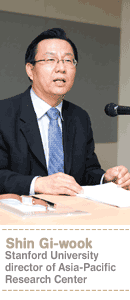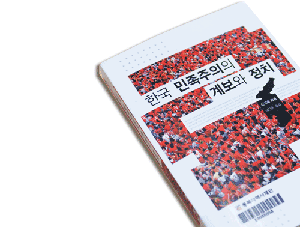동북아역사재단 2009년 07월호 뉴스레터
- LEE Yun-jeong Photos: KIM Hyo-sul

History issues have been very sensitive and significant in the entire region of Northeast Asia. We met with Prof. Shin Gi-wook of Stanford University and director of Asia-Pacific Research Center, who is calling for a new model for reconciliation in Northeast Asia, which has been interlocked in confusion due to the issues of nationalism and history.
Q. You have written many books and papers on nationalism. How have you come to have interest in the issue?
As sociologist, I have been pondering about the principle of moving the Korean society. In addition to the collectivism and family-oriented value, I believe nationalism based on concept of racial homogeneity has been the momentum of moving the Korean society and its people, which is the reason I have been focusing on that matter.
Q. What do you think is the biggest problem with the entanglement of history and nationalism?
For every nation, history is a significant issue related to the identity of the people. But history is different from exact `fact.' As each nation has its own weight on specific history issues, some are remembered while others are forgotten. With own specific `master narratives,' memory and history on the same period is different among Korea, China and Japan. The different memories are recorded in history books to educate their people. Against this backdrop, textbook issue has emerged as grave matters in international relations. Without being able to recognize the difference based on history and nationalism, they have been generating conflicts by presenting their own memories and records to the front.
Q. How do you compare the nationalism of Korea, China and Japan?
China's nationalism is characterized by anti-imperialism, nationalist resistance and national liberation with many similarities with Korea's. But as Japan was the imperial nation, its nationalism tends to stress modernization like Meiji Reform, in stark contrast to Korea and China. There can be no judgment on nationalism itself. The situation changes depending on how the nationalism is connected to certain values. Nationalism in the West has been negatively assessed as it was linked with imperialism while having been positively viewed in Korea, China and the Third World as it was connected to anti-imperialism.
Q. We know that you have been carrying out research on the theme of `History dispute and reconciliation ? in search of Northeast Asian model.'' What is the reason of seeking the Northeast Asian reconciliatory model for conflicted history and what is the direction of the new model?
Over the last two decades, there have been increasing exchanges in various areas of economy, culture and society among the nations in Northeast Asia. But history issue has always been barricades. For Northeast Asia to live peacefully, we need to find a reconciliatory model for the settlement of the issue. Simple comparison between Germany and Japan is not desirable while citing the European reconciliatory model. This is because Europe and Northeast Asia have different history experiences. Though both Germany and Japan were offenders, Japan is at the same time a victim of nuclear attack. So it is not proper to simply apply Europe's model to the Northeast Asia. We need to develop a new model with sophisticated theory that can be accepted in international community and in consideration of history experience and situation of Northeast Asia.
Q. Do you have any specific idea in making up a reconciliatory model for Northeast Asia?
An important variable in Northeast Asia's reconciliatory model is the United States. Though the nation has been refraining from interfering in the issue officially, it has been playing the most significant role in forming regional order in Northeast Asia since 1945. So it cannot be free from the issue. The United States should take responsibility and do its proper role toward that end, given the post-war trials of war criminals which were led by the U.S. and Western powers and the San Francisco Treaty which was signed in the absence of China and Korea. There could be a breakthrough to the history issue in Northeast Asia should the U.S. visit Hiroshima to express condolences for the victims of the atomic bombing. So I will ask the U.S. to reconsider the issues of war criminal trials, San Francisco Treaty and atomic bombing.
Q. Stanford University and the foundation signed an MOU last year. What is the content for the cooperation?

We have been carrying out joint research project for three years to come. At first, we analyzed textbooks of five nations ? Korea, China, Japan, Taiwan and the U.S. This is because we felt the need to fully understand the differences as the foundation toward reconciliation in Northeast Asia. We chose two textbooks of each nation to translate and analyze them for a conference in February last year. Second, we focused on how the five nations understand history through history movies. In December last year, some 500 participants including Clint Eastwood saw movies and engaged in discussions. Third, we plan to select 10 leaders from each nation for interviews. Separate from the project, we have been operating post-doctorate system to enable foundation staffers to be in charge of lecturing and leading seminars at Stanford University.
Q. What do you think the foundation's role in generating reconciliatory model in Northeast Asia history issue?
I think we need to play three kinds of role. First there should be in-depth research to back up the project. Second, we need to link the research outcome to policies through suggestion. Third, we need to set up a network. We should invite noted scholars from abroad to support their research activities, carry out the post-doctorate system and establish a global network by mobilizing various means.
Gi-Wook Shin
Gi-Wook Shin is the director of Shorenste in Asia Pacific Research Center.
Shin is the author/editor of seven books and many articles. His most recent books include Cross Currents: Regionalism and Nationalism in Northeast Asia (2007); Rethinking Historical Injustice and Reconciliation in Northeast Asia (2006); Ethnic Nationalism in Korea:(2006). He has just completed a new book entitled One Alliance, Two Lenses: US-Korea Relations in a New Era. (Stanford Univ Press, 2009).


